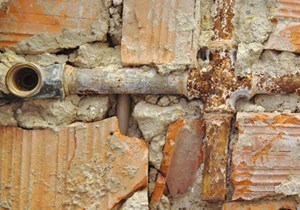New Jersey American Water identifies over 24,000 lead water service lines in need of replacement
(UI) – New Jersey American Water is well on its way to meeting New Jersey’s 10-year lead service line replacement target — with more than 4,000 lead and galvanized steel water service lines replaced to date. Though, with more than 24,000 water service lines currently identified as needing replacement and many more yet to be identified, New Jersey American Water is calling on customers and stakeholders to help speed up progress.

Historically, the material of customer-owned water service lines has not been tracked by water utilities, so completing an inventory of customer-owned service lines is a necessary first step towards replacing all lead or galvanized water service lines.
Recently, the company launched an education campaign about the Lead Service Line Replacement Program with resources for customers, including a step-by-step tutorial showing how to self-identify pipe material and a convenient portal to submit findings. Customers with water service lines confirmed as needing replacement will then need to sign an agreement authorizing New Jersey American Water to complete the necessary work.
“In just one year, our Lead Service Line Replacement Program has made a significant difference across our service areas in New Jersey. But, with thousands of lines left to be replaced, and many more that have yet to be identified, we’re counting on the continued support of our customers, elected officials, and community partners to help us get this done quickly and efficiently,” said Mark McDonough, President, New Jersey American Water. “We’ll do all the work — all we need customers to do is identify their service line material using our online portal, and if it’s confirmed to be lead or galvanized steel, sign the agreement giving our contractors permission to complete the replacement.”
In addition to resources currently available through its education campaign, New Jersey American Water will be stepping up outreach in early August by launching a toolkit and hosting a webinar to arm stakeholders, elected officials, and partners with more resources to help spread the word, educate and engage customers across their service area.
“For this effort to truly be successful, we need everyone to ‘pipe up’ and tell us what their service lines are made of, so we can work together to get the lead out of New Jersey, once and for all,” said McDonough.
Related News
From Archive

- Glenfarne Alaska LNG targets late-2026 construction start for 807-mile pipeline project
- U.S. water reuse boom to fuel $47 billion in infrastructure spending through 2035
- $2.3 billion approved to construct 236-mile Texas-to-Gulf gas pipeline
- Major water pipe break in Puerto Rico hits over 165,000 customers
- Potomac River Tunnel project enters construction phase beneath Washington, D.C.
- Pennsylvania American Water launches interactive map to identify, replace lead water service lines
- Trump's tariffs drive $33 million cost increase for Cincinnati sewer project
- Utah city launches historic $70 million tunnel project using box jacking under active rail line
- Tulsa residents warned after sewer lines damaged by boring work
- Fatal trench collapse halts sewer construction in Massachusetts; two workers hospitalized



Comments